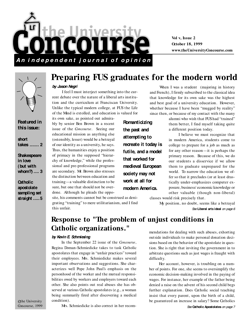A key difference between ‘Church work’ and regular ‘work’
by Peter Cole
I read Regina Doman-Schmiedicke’s article on unjust conditions in a Catholic organization with a great deal of understanding and appreciation. The examples of workplace injustice she cites, if indeed they are accurate, are deplorable.
However, while employers must provide a living wage to workers, there is another issue at work here, namely, the question of individual choice. True, many of us feel called to do Church work while at the same time having a family. Yet, we cannot and must not look at work at Catholic schools, apostolates and charities in the same way we look at an ordinary job in the marketplace. Why? Simply stated, the Church is non-profit and cannot afford to pay the money.
When the Catholic elementary school in my hometown was hiring lay teachers back in the 1950s, our pastor honestly and rightly told the teachers that if they were coming to work for him because they needed the income, they should look elsewhere, for he could not afford to pay the bill. With few exceptions, Catholic organizations are volunteer operations. That means that the workers are voluntarily working there and recognize that they could earn more money doing something else.
There are ways around this, of course. The individual who desires to work with the Church could and probably should do so as a second job with the first being the main source of income for the household. The individual would be able to relieve the parish debt by telling the pastor not to concern himself with salary since they are supported elsewhere for their needs. The pastor, in turn, should not overwhelm the worker with high expectations and demands on the job.
Another viable alternative if this one is not possible would be to have the spouse secure employment. Most of my Catholic school teachers had spouses who had good jobs and this made it possible for the teacher to work for the Church for practically nothing.
This last scenario, obviously, will come into conflict with our ideal of mothers staying at home with the children. While mothers should be home when possible, if the husband feels called to do Church work she needs to realize that the family needs the money. If the husband’s income is not enough to keep the family off food stamps, the wife has an obligation to go out and find work. To allow the family to subsist on social services when it can reasonably be avoided would be a serious moral wrong.
Peter Cole, BA class of ‘95, Masters in education program


